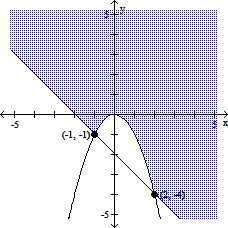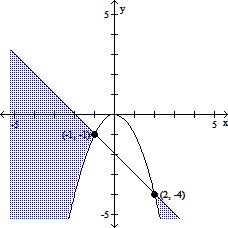Rewrite the expression without absolute value bars.
A. - 
B. ± 
C. 0
D. 
Answer: D
You might also like to view...
State the instructions of the function in words.f(t) = 
A. Multiply the independent variable by 2 and then subtract 8. Square this difference. Add 2 to the independent variable. Divide the first result by the second result. B. Multiply the independent variable by 2 and square the product. Then subtract 8 from the square. Add 2 to the independent variable. Divide the first result by the second result. C. Square the independent variable. Multiply the square by 2 and then subtract 8 from the result. Add 2 to the independent variable. Divide the first result by the second result. D. Subtract 8 from 2 and multiply this difference by the square of the independent variable. Add 2 to the independent variable. Divide the first result by the second result.
Find the slope of the line through the points.(2, -7) and (9, -5)
A. 
B. 
C. - 
D. - 
Find the coordinates of the vertex and the intercepts of the quadratic function. When necessary, approximate the x-intercepts to the nearest tenth.f(x) = x2 - 10x - 11
A. V(5, -6); I(0, 11); (-11, 0); (11, 0) B. V(5, 6); I(0, 11; (1, 0); (-11, 0) C. V(-5, -36); I(0, -11); no x-intercepts D. V(5, -36); I(0, -11); (11, 0); (-1, 0)
Graph the system of inequalities and the points of intersection of the graphs. Label the points of intersection with their coordinates.y ? -x2x + y ? -2
A. 
B. 
C. 
D. 